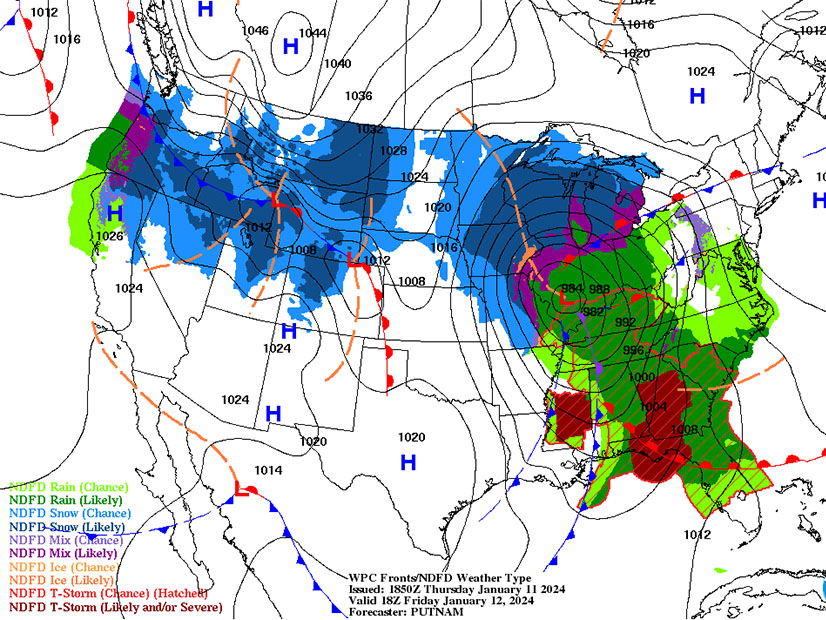
NERC is urging electric stakeholders to take preparations ahead of a winter storm system that the National Weather Service expects to “hammer much of the eastern half of the” U.S. this weekend and next week.
In a statement earlier this week, the ERO said the coming weather “has the potential to create significant challenges, especially in major metropolitan areas.” Predictions by the NWS include blizzard conditions with 6-12 inches of snow from eastern Nebraska to central Michigan, and potentially more than a foot of snow in northern lower Michigan.
Much of Montana and North Dakota is expected to see temperatures fall below zero degrees Fahrenheit Jan. 12, with single-digit temperatures likely in the Central Plains, Iowa and Minnesota. These conditions will likely persist “well beyond the end of the week,” the NWS said.
Additionally, high winds are expected in the Deep South and Southeast U.S. with the possibility of tornadoes. While rainfall totals are expected to be relatively light compared to earlier this week, parts of the Mid-Atlantic and Northeast, already saturated by heavy rain, may experience floods. NWS is also forecasting “unsettled weather conditions” in the West, with the Oregon Cascades, along with the coasts of Oregon and northwestern California, predicted to receive several feet of snow.
In a video posted Tuesday, NERC CEO Jim Robb said that “while forecasts do not indicate that this polar air mass will dip as far south as it did during Winter Storm Uri in 2021, the concerning pattern shows a much colder and broader area of impact.” He asked industry to “take this upcoming weather system extremely seriously and be prepared for extreme temperatures and wind chills.”
NERC said stakeholders will need to pay “prudent attention throughout the long holiday weekend” to winterization and fuel supplies. The ERO encouraged generator owners and operators, reliability coordinators, balancing authorities, transmission operators and fuel suppliers to evaluate energy adequacy, and load-serving entities to “review their demand projections to ensure the highest levels of reliability.”
NERC’s release mentioned the ERO’s “comprehensive approach” to preparing for and mitigating the impacts of severe weather events, including the new cold weather standards EOP-012-1 (Extreme cold weather preparedness and operations) and EOP-011-3 (Emergency operations) approved by FERC last February. (See FERC Orders New Reliability Standards in Response to Uri.)
Work on additional cold weather standards continues at NERC: The organization’s Board of Trustees voted in October to send EOP-011-4 and TOP-002-5 (Operations planning) to FERC for approval. NERC’s board also warned last month that it is prepared to unilaterally approve the proposed standard EOP-012-2 — which FERC ordered the ERO to submit for approval by February 2024 — if it fails its next ballot round this month. (See NERC Board May Force Action on Cold Weather Standard.)
NERC warned in its 2023 Winter Reliability Assessment that much of North America faces elevated or high risk of energy shortfalls during extreme weather conditions this winter. A common theme in multiple regions was that generation has not kept pace with demand growth, with the added concern in New England that using natural gas for both home heating and electric generation could place unsustainable burdens on the gas delivery infrastructure. (See NERC: Grid Risks Widespread in Winter Months.)
This week’s statement also mentioned NERC’s 2023 Long-Term Reliability Assessment, which advised that “integrated planning and effective coordination [are] imperative” in light of the growing interdependence between North America’s gas infrastructure and electric grid and the risks posed to both systems by extreme cold temperatures.

